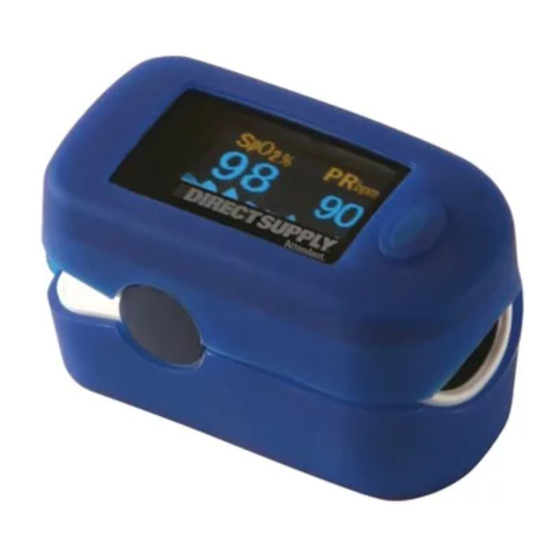Direct Supply Attendant EFP1 Instrukcja obsługi
Przeglądaj online lub pobierz pdf Instrukcja obsługi dla Sprzęt medyczny Direct Supply Attendant EFP1. Direct Supply Attendant EFP1 4 stron. Fingertip pulse oximeter

Attendant
Fingertip Pulse Oximeter
®
Owner's Manual
Thank you for purchasing an Attendant
read this entire guide carefully and keep it for future reference. This guide will provide you with instructions, warnings,
warranty information and other important information about your Attendant Pulse Oximeter. Share this information with
your nursing, housekeeping and maintenance staff to help ensure the Pulse Oximeter is cared for properly. Please keep
and refer to this owner's manual.
Introduction
Attendant Fingertip Pulse Oximeters are easy to use and
simple to understand. The one-button keypad provides the
functionality to quickly check blood-oxygen concentration
levels and pulse rate. The color display allows caregivers
to quickly assess resident needs and provide care without
being intrusive into the daily lives of their residents.
Definitions & Symbols
• CAUTION: Indicates correct operating or maintenance
procedures in order to prevent damage to or destruction of
the equipment or other property.
• WARNING: Calls attention to a potential danger that
requires correct procedures or practices in order to prevent
personal injury.
DEVICE: Your Attendant Fingertip Pulse Oximeter.
YOU and YOUR: The facility, community or other entity that
has purchased the device.
WE, US, and OUR: Direct Supply
• Attention. Read the instructions.
: Type BF applied part
: Protected against dripping water
IPX1
: Oxygen saturation
%SpO
2
: Pulse rate (BPM)
: Low-power indication
: No SpO
Alarm
2
: Waste electrical and electronic equipment
: Storage temperature and relative humidity
: Follow instruction for use
: Date of manufacture
SN: Serial number
: Manufacturer's information
Specifications
Measures 2
⁄
" x 1
⁄
" x 1
⁄
1
1
1
4
4
2
Weighs 1.75 oz. with batteries
SpO
accuracy: +/2% at 80% to 99%; +/3% at 70% to
2
80%; undefined at less than 70%
Pulse rate accuracy: +/2% or 2 bpm from 30 to 235 bpm
Pulse rate range: 30 to 235; SpO
Automatically shuts off after 8 seconds
Includes protective rubber boot
Fingertip Pulse Oximeter from Direct Supply Equipment & Furnishings
®
Manufacturing
®
™
"
range: 0% to 100%
2
1-800-634-7328 DirectSupply.com
Product Description
The Attendant Fingertip Pulse Oximeter is a portable
noninvasive way to spot-check the oxygen saturation of
arterial hemoglobin (SpO
homes, hospitals and Long Term Care communities. The
device is suitable for home use only when prescribed by a
licensed healthcare professional. NOT FOR CONTINUOUS
MONITORING. The Oximeter requires no routine calibration or
maintenance other than the replacement of batteries.
Product Properties
Operation of the Oximeter is simple and convenient. The device
is small and light, weighing about 1.75 oz. (50 g) including
batteries. Power consumption is low and the two originally
equipped AAA batteries can be operated continuously for up
to 30 hours. The low-battery indicator will light on the display
screen when the batteries need to be replaced. To conserve
battery life, the device automatically powers off after 8 seconds
, Inc
if no finger is present in the device.
Warnings
BEFORE USE, CAREFULLY READ THIS ENTIRE MANUAL.
• WARNING – EXPLOSION HAZARD: DO NOT USE THE
DEVICE IN AN EXPLOSIVE ATMOSPHERE. Operation of
device may be affected by the use of an electrosurgical unit
(ESU). Do not use the device in an MRI or CT environment.
• WARNING – Do not use where SpO
required. THE DEVICE HAS NO ALARMS.
• WARNING – Do not use if resident has hypotension,
severe vasoconstriction, severe anemia or hypothermia. Do
not use if the resident is in cardiac arrest or is in shock.
• WARNING – Verify nothing is hindering the pulse
measurement before relying on the SpO
The device must be able to measure the pulse properly
to obtain an accurate SpO
following, or a combination of the following, may cause
inaccurate test results:
• Significant levels of dysfunctional hemoglobins (such as
carboxyhemoglobin or methemoglobin)
• Intravascular dyes, such as indocyanine green or methylene blue
• Excessive resident movement
• High-frequency electrosurgical interference and defibrillators
Model EFP1
. Please
®
) and pulse rate of adults in nursing
2
or other alarms are
2
measurement.
2
measurement. Any of the
2
